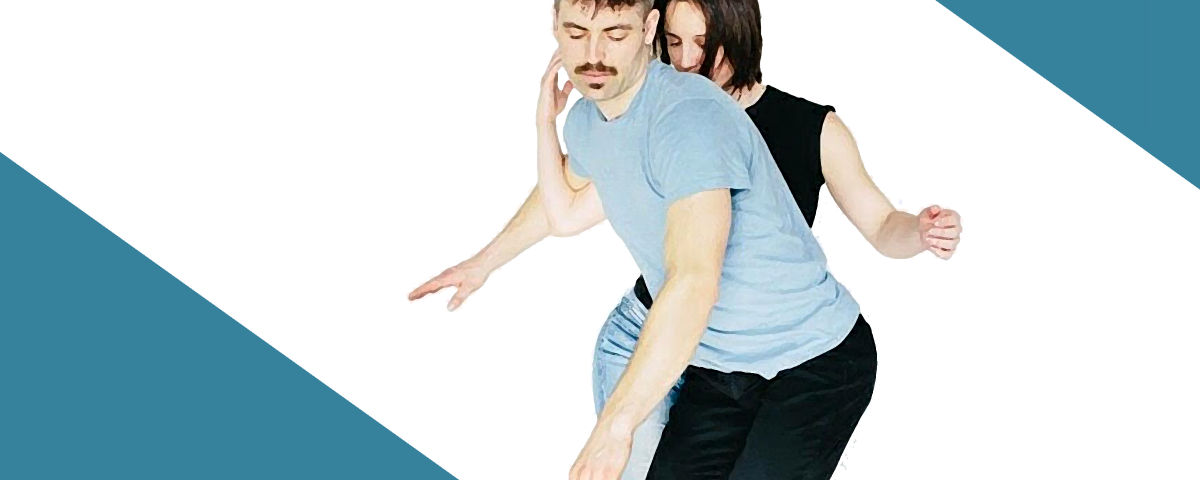In-progress showing – Jennifer McLeish-Lewis: Study #1 – Mar 2, 2018

Jennifer McLeish-Lewis: Study #1
In-progress showing (Free event)
Friday, March 2, 2018, 1:30 – 2:30 pm
The Annex, 823 Seymour St, Vancouver
RSVP via eventbrite.ca
Terence McKenna’s lecture about the evolution of language is the inspiration for Study #1. In it, McKenna discusses how an octopus changes colour situationally, wearing its emotions as an overcoat; its feelings emerge as a kind of language.
Study #1 is concerned with how our language evolved. Small-mouth noises are ambiguous; my internal dictionary could diverge from yours and could be misconstrued depending on context, personality or chance. Study #1 offers a physical language, a language of the body, using shared vocabularies of contact and contemporary dance. The development of language, like this work, is awkward, strange, and funny.
Jennifer McLeish-Lewis: Study #1
Choreographer: Jennifer McLeish-Lewis
Dancers: Walter Kubanek, Sarah Formosa, Jennifer McLeish-Lewis
Outside Eye: Delia Brett
Music: Stefan Smulovitz
ABOUT THE ARTIST:
Jennifer McLeish-Lewis is a dance artist who performs, choreographs, and teaches. Jennifer trained across Canada at The Alberta Ballet School, The School of Toronto Dance Theatre and MainDance in Vancouver. As a dancer, she has performed in Canada, the United States, and Europe. She worked for MACHiNENOiSY and Marta Marta Productions from 2002-2012 as a dancer. As a choreographer, Jennifer’s work has been presented by The Dance Centre, Dancing on the Edge, OFF VIDF, DIY at Dance in Vancouver, The Seattle International Dance Festival, Short and Sweet in Montreal, Crimson Coast in Nanaimo, and Lucky Trimmer in Berlin. Her choreography has been supported by BC Arts Council and Canada Council for the Arts and was recently awarded the full grant amount in both for her new Dance on Screen project, directed by Lynne Stopkewich.
ARTIST PRACTICE:
Jennifer McLeish-Lewis is currently fascinated by the impact of borders and limitations on thought and creativity. She is eager to transcend limitations in both form and content. Her work straddles traditional/rigorous training and the ephemerality of contact improvisation. She is keen to destroy the artificial separations between dance and other forms of live performance; cross-pollination and collaboration between different media have always been crucial to her work. She listens to the unconscious score of a body and the systems that ground it and create the choreography in response. This way we can make the familiar strange and the strange familiar, allowing the body to get caught in a glitch – slower or faster than normal – or call attention to a movement by changing the sequence and scale. The humour in her dance language often comes from surprise, allowing for awkwardness over perfection. People aren’t always graceful in life, and when imperfections shine through the surface, they can be beautiful.
Drawn to the near-misses, Jennifer McLeish-Lewis’ context revolves around her identity as an intersectional feminist, aiming to transform both the portrayal and the perception of women both inside and outside of the dance world. She believes that the more personal the work, the more universal its impact. In its dependence on Contact, in its fearless confrontation of discomfiting subject matter, and in its utilization of solos and duets instead of large group work; her work doesn’t resemble that of her peers’ but instead has a provocative and arresting quality that is all her own.
